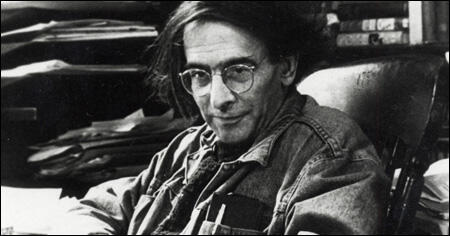History Workshop Movement
In 1967 saw the arrival of the History Workshop Movement. It emerged from Ruskin College, where Raphael Samuel, the movement's initiator and presiding spirit, taught history for many decades. Samuel borrowed the name from one of his heroines, Joan Littlewood, founder of Theatre Workshop. (1)
Other important figures in the History Workshop movement included Anna Davin, Alun Howkins and Sally Alexander. The workshops that were held every year attracted up to a thousand participants. While the themes explored varied widely, the events were primarily a showcase for history seen from a non-elite perspective, "people's history" as it was labelled. In the early years this meant primarily working-class history (2)
History Workshop Conference of November 1968 played a central organising role in developing what became known as women's history. Keith Flett has argued that the History Workshop was an attempt to actively recover the history of ordinary people and their movements. "In many ways this was a step forward from the sometimes rather rigid orthodoxies of more mechanical Marxist histories." (3)

In 1976 Raphael Samuel launched the History Workshop Journal that has been described as "one of the world's leading journals of radical history. It is committed to innovative scholarship, accessible writing and lively engagement with the politics of historical knowledge." Samuel described the History Workshop Movement as a "loose coalition of worker-historians and full-time socialist researchers". History Workshop had an annual conference and helped to organise local networks and federations - which spread across Europe and Scandinavia. (4)
Carol Adams, an early supporter of the History Workshop movement, saw the possibilities of this approach to classroom teaching: “In terms of the history curriculum then, change can be introduced in two ways: by ‘chipping away' at the accepted view of history - both its facts and its evidence, and through the introduction of new materials. Hopefully more educational publishers will start to respond to the implications of this. Examination boards must be pressurized to include questions about women in examination papers and to acknowledge their existence in a far wider context than at present. No responsible teacher in the upper school is going to launch into extensive work about women if there is no chance of it being examined.” (5)
Primary Sources
(1) Barbara Taylor, History of History Workshop (22nd November 2012)
History Workshop was a popular movement for the democratisation of History which flourished in Britain from the late 1960s to the mid 1980s (with sporadic activity continuing into the 1990s). It emerged from Ruskin College Oxford where Raphael Samuel, the movement’s initiator and presiding spirit, taught history for many decades. In the course of the 1970s History Workshop spread across Britain, spawning dozens of regional and local initiatives, publishing many books, pamphlets and journals (including the still-extant History Workshop Journal), and acquiring influence throughout intellectual and educational circles. During these years the movement also went international, spawning sister workshops in Germany, France, Italy, South Africa and America. Its high point was reached in the late 1970s, and thereafter it went into a slow decline, although many of the developments it helped to foster (such as oral history and women’s history) continue to flourish today.
(2) Carolyn Steedman, Radical Philosophy (March, 1997)
Raphael Samuel's lasting memorials will be the work he inspired in the generations of students he taught at Ruskin College, Oxford, from 1962 to 1996, and History Workshop, in its protean forms of annual conferences, local networks and federations - which spread across Europe and Scandinavia - and its eponymous journal. A loose coalition of worker-historians and full-time socialist researchers was what he called it.
(3) Gareth Stedman-Jones, The Independent (March, 1997)
Samuel gave new meaning to the idea of history as an experimental art, inventing the History Workshop (a term he borrowed from one of his heroines, Joan Littlewood, founder of Theatre Workshop) first as a local and then as an international movement. The extent of his empathy was exceptional. No one charted more exactly the ways in which the Industrial Revolution had increased the extent of toil in every branch of Victorian industry, but no one could have acknowledged more generously the contribution of Tory antiquaries in Early Hanoverian England to the writing of national history. His cast of historical actors ranged from Catholic priests ministering among the post-famine Irish poor, the proletarian Gladstonian roughs of Headington Quarry through South Wales village Bolsheviks in the 1920, to the mobsters of the Edwardian East End underworld.
(4) Keith Flett, Socialist Review (January, 1997)
Raphael Samuel was one of the most prominent historians in the country to support history from below the attempt to actively recover the history of ordinary people and their movements. In many ways this was a step forward from the sometimes rather rigid orthodoxies of more mechanical Marxist histories. It fed in directly, too, to the resurgence of socialist ideas after 1968 and to the birth of the women's movement in which the History Workshop Conference of November 1968 played a central organising role.

